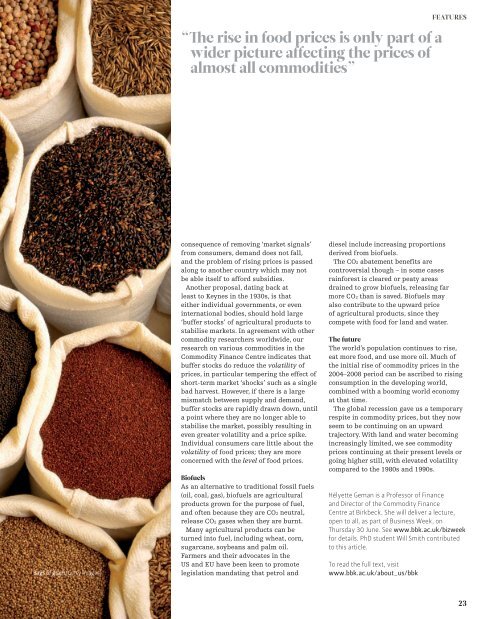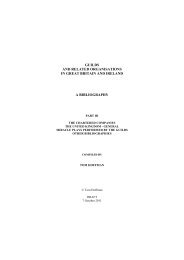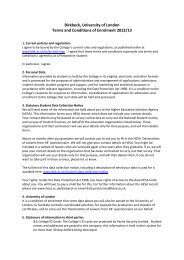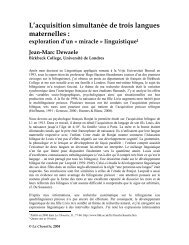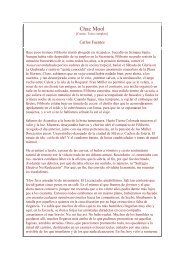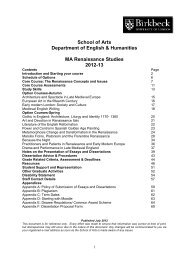Spring 2011 - Birkbeck College
Spring 2011 - Birkbeck College
Spring 2011 - Birkbeck College
Create successful ePaper yourself
Turn your PDF publications into a flip-book with our unique Google optimized e-Paper software.
Bags of grain (Getty Images)<br />
“The rise in food prices is only part of a<br />
wider picture affecting the prices of<br />
almost all commodities”<br />
consequence of removing ‘market signals’<br />
from consumers, demand does not fall,<br />
and the problem of rising prices is passed<br />
along to another country which may not<br />
be able itself to afford subsidies.<br />
Another proposal, dating back at<br />
least to Keynes in the 1930s, is that<br />
either individual governments, or even<br />
international bodies, should hold large<br />
‘buffer stocks’ of agricultural products to<br />
stabilise markets. In agreement with other<br />
commodity researchers worldwide, our<br />
research on various commodities in the<br />
Commodity Finance Centre indicates that<br />
buffer stocks do reduce the volatility of<br />
prices, in particular tempering the effect of<br />
short-term market ‘shocks’ such as a single<br />
bad harvest. However, if there is a large<br />
mismatch between supply and demand,<br />
buffer stocks are rapidly drawn down, until<br />
a point where they are no longer able to<br />
stabilise the market, possibly resulting in<br />
even greater volatility and a price spike.<br />
Individual consumers care little about the<br />
volatility of food prices; they are more<br />
concerned with the level of food prices.<br />
Biofuels<br />
As an alternative to traditional fossil fuels<br />
(oil, coal, gas), biofuels are agricultural<br />
products grown for the purpose of fuel,<br />
and often because they are CO2 neutral,<br />
release CO2 gases when they are burnt.<br />
Many agricultural products can be<br />
turned into fuel, including wheat, corn,<br />
sugarcane, soybeans and palm oil.<br />
Farmers and their advocates in the<br />
US and EU have been keen to promote<br />
legislation mandating that petrol and<br />
FEATURES<br />
diesel include increasing proportions<br />
derived from biofuels.<br />
The CO2 abatement benefits are<br />
controversial though – in some cases<br />
rainforest is cleared or peaty areas<br />
drained to grow biofuels, releasing far<br />
more CO2 than is saved. Biofuels may<br />
also contribute to the upward price<br />
of agricultural products, since they<br />
compete with food for land and water.<br />
The future<br />
The world’s population continues to rise,<br />
eat more food, and use more oil. Much of<br />
the initial rise of commodity prices in the<br />
2004–2008 period can be ascribed to rising<br />
consumption in the developing world,<br />
combined with a booming world economy<br />
at that time.<br />
The global recession gave us a temporary<br />
respite in commodity prices, but they now<br />
seem to be continuing on an upward<br />
trajectory. With land and water becoming<br />
increasingly limited, we see commodity<br />
prices continuing at their present levels or<br />
going higher still, with elevated volatility<br />
compared to the 1980s and 1990s.<br />
Hélyette Geman is a Professor of Finance<br />
and Director of the Commodity Finance<br />
Centre at <strong>Birkbeck</strong>. She will deliver a lecture,<br />
open to all, as part of Business Week, on<br />
Thursday 30 June. See www.bbk.ac.uk/bizweek<br />
for details. PhD student Will Smith contributed<br />
to this article.<br />
To read the full text, visit<br />
www.bbk.ac.uk/about_us/bbk<br />
23


